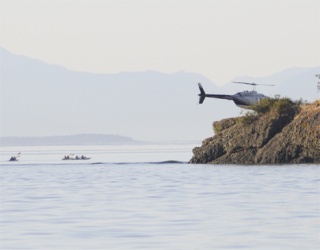There’s no doubt about his skill. But it’s his judgment that’s in question as federal agents investigate why a pilot would land a 39-foot long helicopter on the southernmost tip of tiny Freeman Island.
According to witnesses, the Bell Jet Ranger hovered over the south end of the island for a short time and then touched down at about 7 p.m. on Aug. 3. It was back in the air about 30 minutes later and then disappeared.
David Lee of Newcastle had trouble believing his eyes. For 39 years or so, he’s spent summer vacations with family and friends on the west side of Orcas Island. In that time, Lee recalls seeing aircraft of all types glide through President Channel and a few float planes nose up to the island.
But never this.
“They were hovering pretty low so at first we thought they might be responding to some sort of emergency, or may be having engine trouble,” Lee said. “I’ve seen a float plane or two come up to the island, but this was a first. I’ve never seen a helicopter land on it.”
Lee snapped photos from the shore while a fellow camper at Beach Haven Resort hopped in a boat and headed to the island to find out more. According to that camper, when the pilot was asked about the landing, he replied that he and his passenger decided it would be a nice spot to drop down and have dinner.
The helicopter’s tail numbers were clearly visible on the photos. An Internet search by Lee revealed it belonged to a Renton-based helicopter company that offers chartered flights.
Based on tail numbers, Rick Dominy, general manager of WorldWind Helicopters, Inc., said the Ranger appears to be theirs. Its choppers are no stranger to the islands and, Dominy noted, the Bonneville Power Administration is a frequent client.
“We land up in the San Juans a lot,” Dominy said. “I’ll have to do some due diligence to see who was up there and what was going on.”
Dominy said he’s unsure whether at that time the Ranger was involved in a commercial flight or private sojourn. He said few restrictions exist on where a recreational pilot can land, but that commercial pilots would need “in theory” the permission of a property owner to land.
The touchdown took Nick Teague of the U.S. Bureau of Land Management by surprise. Teague, who manages the agency’s San Juan properties, said in most cases a permit would be required before an aircraft landed on BLM land, and that he knows of no such request regarding Freeman Island. He said the bureau’s regional law enforcement officer, based in Wenatchee, has been supplied with photos and is investigating.
Teague said that Freeman, totaling an acre or two at best, is unique in its array of natural features and vulnerable because of its close proximity to shore. Any request to land a helicopter on it would trigger a “full-scale, internal agency review,” which, according to Teague, would be difficult to pass.
“It’s an amazing intact ecosystem,” he said. “It’s an absolute treasure as well as an area of critical environmental concern.”
At nearby Camp Orkila, camp Director Dimitri Stankevich said Freeman is a favorite place for campers to explore, especially when parents and children get together as part of the weekend Adventure Guide Program. But steps are taken, he said, to ensure that those who paddle out to the island don’t neglect its fragile habitat.
“Everyone gets a briefing about do’s and don’ts and they spend may be 20 minutes or so there exploring,” he said. “We are, after all, an environmental learning center.”
Teague expects the investigation will likely result in educating the helicopter company about potential hazards to the island’s habitat, as well as protocols for landing on BLM property. It’s possible, he said, the pilot was unaware the helo was off-limits and without a permit.
Pursuing a penalty in such cases can prove more trouble than its worth.
“I’m sure we’ll be sharing information about the sensitive nature of our outer islands and, depending on the investigation, we’ll go from there,” Teague said. “We always like to focus on the resource.”




